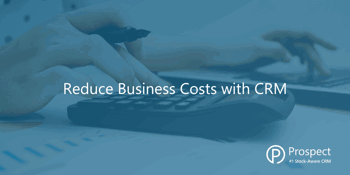
Reduce Business Costs with CRM
With business costs at an all-time high, cutting your expenses has never been so important. Learn how you can use CRM to optimise your efficiency; reducing expenditure while continuing to maximise growth as a small business.
During a period where inflation is reaching record heights and the cost of living crisis is permeating our daily lives and into the workplace, there isn’t a better time than now to evaluate your business expenses. Although there’s no immediate remedy to the incessant financial struggle that we’re all facing in the current climate, weighing up your options and considering ways to cut business costs is a good place to start.
How Can CRM Help?
Unifies user experience
CRM shares customer contacts across your entire company, meaning all resources are available in a unified format. Not only does this eliminate the need to spend valuable time and money on other resources and systems that store these details, it also means that all your customer, product, and sales information can be pooled into one centralised and accessible location for your whole team to see.
Transfigures raw data into functional metrics
A system that can amalgamate atomic data and convert these numbers into actionable reports can provide a solution to many of the most common business pain points. CRM reports allow you to gather and interpret the unprocessed statistics that are generated during your sales process by transforming quantitative data into intelligible, qualitative information. These insights can help you to identify which processes are attaining a successful outcome and which methods you should be abandoning or adapting if they aren’t achieving the desired results. Ultimately, CRM reports help you to discern where you’re excelling in your operations and, in turn, where to confidently invest in your company.
Generating manual reports can also be an onerous undertaking when the data is constantly being updated, so investing in a CRM system will automate this process for you and increase the frequency of report production.
Perfects your production line
Utilising CRM reports, as well as the plethora of product intelligence the software provides, you can track the success of your sales and adapt your product line accordingly. Being able to recognise patterns in your buyers’ behaviour is a fundamental contributor to successful cost-cutting within businesses, and a CRM that can store comprehensive product information adds a sense of ease to this task. A Stock-Aware CRM gives you a hold on product data that’s nearly unimaginable using just a manually updated spreadsheet and a bit of trial and error.
Makes customer service your first concern
CRM provides a platform to engage with your customers post-sale and resolves any issues they’re experiencing. Having the ability to log all of your customers’ queries and problems in your primary portal means you don’t have to fork out funds on a separate customer service portal that’s isolated from your central database. A CRM that offers this function reduces the number of channels that need to be monitored, lessening the expenditure on hiring additional employees to manage each one.
Finding the Right CRM
Successfully cutting business costs is unachievable with a CRM that doesn’t complement the needs of your business. If you’re selling physical products business-to-business, it’s essential that your CRM has the means to monitor and store crucial information about your stock levels, as well as the ability to seamlessly integrate with your Inventory Management/ERP system. Without these key features, efficiency within your business operations won’t be able to reach full capacity, meaning the search for a CRM that suits your business requirements can make or break the success of your cost-cutting efforts.
Stock-Aware CRM
For B2B wholesalers, distributors, and manufacturers, it’s important that the CRM you implement has the ability to integrate effortlessly with your back-office systems that manage your inventory. CRM systems that are stock-aware are designed specifically to cater for the needs of product-selling businesses who rely heavily on the retention of existing customers to stimulate business growth. Traditional CRMs tend to fall short in this area, as they typically focus on acquiring new leads rather than nourishing pre-established customer relationships, so ensuring your CRM is able to assimilate and mitigate the unique challenges your company faces is crucial in minimising business expenses.
Want to start cutting costs and increasing business efficiency? Take the first step by signing up to a 14-day free trial of Prospect CRM today!
